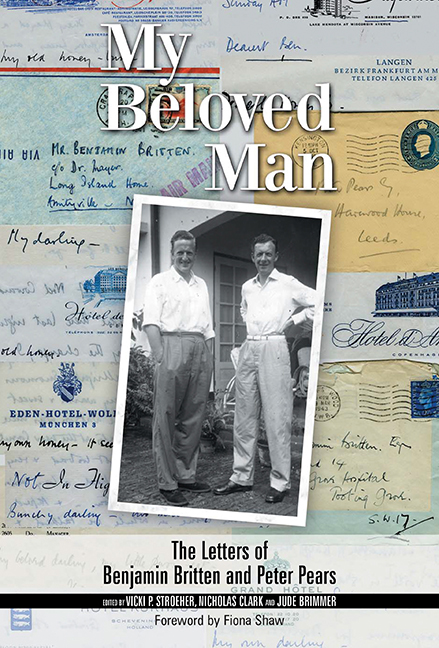Book contents
- Frontmatter
- Dedication
- Frontispiece
- Contents
- List of Plates
- List of Illustrations
- Foreword by Fiona Shaw
- Acknowledgements
- Editorial Note
- Introduction: Britten and Pears's ‘personal and consistent’ Correspondence
- THE LETTERS
- I ‘When I am not with you’: August 1937 to January 1941: Letters 1–12
- II ‘My life is inextricably bound up in yours’: May 1942 to November 1944: Letters 13–70
- III ‘I don't know why we should be so lucky, in all this misery’: July 1945 to April 1949: Letters 71–125
- IV ‘You are potentially the greatest singer alive’: Late 1949 to January 1954: Letters 126–88
- V ‘Why shouldn't I recognise that you are such a large part of my life’: May 1954 to December 1959: Letters 189–246
- VI ‘Far away as you are, at least I feel there is contact!’: January 1960 to March 1968: Letters 247–313
- VII ‘It is you who have given me everything’: January 1970 to June 1975: Letters 314–53
- VIII ‘My days are not empty’: January to November 1976: Letters 354–65
- Personalia
- List of Works
- Select Bibliography
- General Index
- Plate section
V - ‘Why shouldn't I recognise that you are such a large part of my life’: May 1954 to December 1959: Letters 189–246
from THE LETTERS
Published online by Cambridge University Press: 05 July 2016
- Frontmatter
- Dedication
- Frontispiece
- Contents
- List of Plates
- List of Illustrations
- Foreword by Fiona Shaw
- Acknowledgements
- Editorial Note
- Introduction: Britten and Pears's ‘personal and consistent’ Correspondence
- THE LETTERS
- I ‘When I am not with you’: August 1937 to January 1941: Letters 1–12
- II ‘My life is inextricably bound up in yours’: May 1942 to November 1944: Letters 13–70
- III ‘I don't know why we should be so lucky, in all this misery’: July 1945 to April 1949: Letters 71–125
- IV ‘You are potentially the greatest singer alive’: Late 1949 to January 1954: Letters 126–88
- V ‘Why shouldn't I recognise that you are such a large part of my life’: May 1954 to December 1959: Letters 189–246
- VI ‘Far away as you are, at least I feel there is contact!’: January 1960 to March 1968: Letters 247–313
- VII ‘It is you who have given me everything’: January 1970 to June 1975: Letters 314–53
- VIII ‘My days are not empty’: January to November 1976: Letters 354–65
- Personalia
- List of Works
- Select Bibliography
- General Index
- Plate section
Summary
Britten's relentless schedule of writing and performing began to take its toll on his health. Towards the end of 1953 he received confirmation that an aching, burning sensation in his right shoulder that had plagued him for several months was bursitis. The ailment, he wrote to E.M. Forster, prompted his doctors to forbid him using the arm, which brought a temporary halt to performance and composition. Work on the new chamber opera, The Turn of the Screw, was delayed until 30 March 1954, leaving him little more than five months to complete it in time for the premiere in Venice, scheduled for the following September.
There is a pause in the correspondence when Britten and Pears embark together on a lengthy international tour towards the end of 1955. Beginning in Holland, they travelled across the continent to Istanbul, then flew to India and on to Malaysia, Indonesia, China and Japan. The trip included concert engagements in Europe in October and November, and Japan (one of which was recorded by NHK Television, their television debut) in February 1956. Although the trip was intended partly as a holiday, an enforced rest for Britten, the unfamiliar, exotic cultures he experienced proved to be a rich source of inspiration for him. Both musicians were captivated by traditional Japanese theatre, especially the Noh drama Sumidagawa that eventually became a model for Curlew River, the first of the three Church Parables. The most immediate legacy, however, arose from a visit to Bali, where Britten's experience of the gamelan led him to incorporate its percussive sounds and rich, alien sonorities into his latest project, the ballet The Prince of the Pagodas. With a scenario and choreography by John Cranko, the work was finally premiered at the Royal Opera House on New Year's Day, 1957. Later that year the singing of East Anglian schoolchildren inspired him to adapt the medieval Chester Miracle Play for a new type of opera, Noye's Fludde. Composed primarily as a work for community performance, it was premiered at the 1958 Aldeburgh Festival by a combination of schoolchildren and professional musicians. Britten was also inspired by the artistry of fellow musicians, for example in 1954 he composed Canticle III: Still Falls the Rain, for himself and Pears to perform with virtuoso horn player Dennis Brain, to verses by Edith Sitwell.
- Type
- Chapter
- Information
- My Beloved ManThe Letters of Benjamin Britten and Peter Pears, pp. 203 - 264Publisher: Boydell & BrewerPrint publication year: 2016

